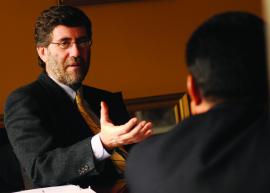Andrea Bartoli and the Evolution of ICAR
Andrea Bartoli and the Evolution of ICAR
 It isn’t often that one senses a new phase of development beginning. Usually, these commencements go unremarked. Only later does it become clear that an event which seemed relatively continuous with the past was actually a door opening upon a new stage of one’s personal or professional life. Prediction is a hazardous business, of course. In ancient Rome, “inauguration” meant reading the entrails to foretell the fates of the leader and the state. Nonetheless, Andrea Bartoli’s inauguration as ICAR director seems to me an event both reflective and generative of a new period of transformation. Professor Bartoli came to ICAR two years ago as Christopher Mitchell’s successor in the Drucie French Cumbie Chair of Conflict Resolution. Since that chair was designed to be occupied by a world-class conflict resolution practitioner, scholar, and teacher, there was much talk on the search committee of “replacing the irreplaceable,” but fortune smiled upon us twice. First, Chris Mitchell remained a powerful, creative force at ICAR. Second, Andrea had the rare combination of talents, experiences, and character needed to do the job brilliantly. These same abilities made him a natural choice to succeed the redoubtable Sara Cobb as director of the Institute. Resumes are misleading not for what they say, but for what they omit. So it is with Andrea’s.
It isn’t often that one senses a new phase of development beginning. Usually, these commencements go unremarked. Only later does it become clear that an event which seemed relatively continuous with the past was actually a door opening upon a new stage of one’s personal or professional life. Prediction is a hazardous business, of course. In ancient Rome, “inauguration” meant reading the entrails to foretell the fates of the leader and the state. Nonetheless, Andrea Bartoli’s inauguration as ICAR director seems to me an event both reflective and generative of a new period of transformation. Professor Bartoli came to ICAR two years ago as Christopher Mitchell’s successor in the Drucie French Cumbie Chair of Conflict Resolution. Since that chair was designed to be occupied by a world-class conflict resolution practitioner, scholar, and teacher, there was much talk on the search committee of “replacing the irreplaceable,” but fortune smiled upon us twice. First, Chris Mitchell remained a powerful, creative force at ICAR. Second, Andrea had the rare combination of talents, experiences, and character needed to do the job brilliantly. These same abilities made him a natural choice to succeed the redoubtable Sara Cobb as director of the Institute. Resumes are misleading not for what they say, but for what they omit. So it is with Andrea’s.
We know, for example, that he is an internationally renowned peacemaker with significant experience in resolving conflicts on four continents, most famously Africa, where he and his colleagues brought Mozambique’s horrific civil war to a conclusion and helped start that nation on the road to reunification and peaceful development. We know, too, that he was the founding director of Columbia University’s highly successful Center for International Conflict Resolution (CICR), and that he is a senior vice-president and special representative to the UN of the remarkable Community of Sant’ Egidio, the world’s leading Roman Catholic peacemaking organization. Among his many research-and-action projects, Andrea founded and currently directs Engaging Governments in Genocide Prevention (EGGP), a multi-year program involving scholars and governments around the world in concrete steps to prevent mass murder. His CV lists a wide range of courses taught as well as books and articles published, the latest of which is The Contributions of NGOs to Conflict Resolution Activities (Brill, 2009). So what does the resume omit? Only the essential: the ways Andrea relates to other people, including his moral passion, capacity for empathetic listening, powers of communication, institutional creativity, and style of leading “from within.” There are at least four points at which these particular qualities intersect the development of ICAR and may hasten the next stage of its evolution:
(2) Revitalizing praxis. ICAR’s original ambition, formulated with special clarity during the John Burton years, was to become a leader of the field, both in theory-building and practice, a task requiring us to link ideas with practical action through the mutually correcting and strengthening feedback processes known as praxis. As ICAR expanded, greatly increased demands for teaching, mentoring, and administrative committee work made it difficult for many of us to combine research and writing creatively with practice. Thanks to organizational reforms made by Sara Cobb, administrative demands on the faculty decreased and teaching schedules became more flexible. Moreover, both the range of useful research methods and the variety of types of practice are expanding. We are counting on Andrea’s commitments to erasing artificial theory/practice boundaries and reworking institutional structures to unleash people’s creativity and help us take the next step toward a revitalized praxis.
(3) Raising ICAR’s public profile and influencing public policy. Under Sara Cobb’s leadership, the Institute made its presence felt in Washington, D.C., with faculty and students speaking out on vital issues of the day and proposing better methods of resolving/transforming serious transnational and domestic conflicts. Andrea Bartoli’s expertise in public representation, organizing multi-institutional projects and forums, and giving voice to our collective values and ideas should accelerate this development. Equally important, his international reputation and global networks should help us to develop as a global resource for civil society members and policy makers interested in resolving conflicts effectively and non-violently.
Andrea Bartoli comes to ICAR at a crucial moment in its evolution. He understands as well as anyone does that we are no typical academic institution. Fortunately, Andrea Bartoli is no typical leader.




